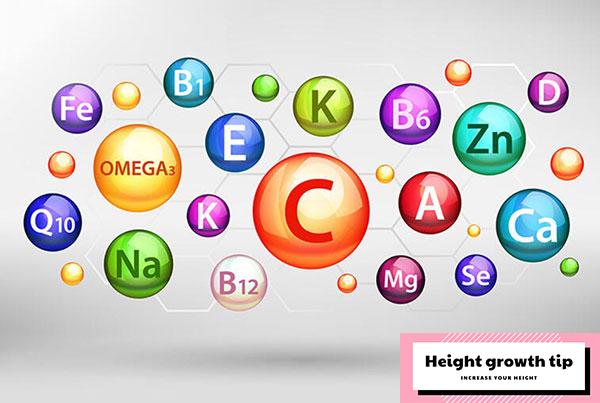As parents, we want our children to grow up healthy and reach their full potential, including their height. While genetics play a major role, research suggests that certain vitamins, minerals, and regular exercise can help support growth and development. This article will discuss the essential nutrients that experts recommend for optimal growth, as well as tips for incorporating them into your child’s diet routine. By providing the right dietary support, you can give your child the best chance to thrive and reach their maximum height potential.
Unlocking Height Potential: The Role of Vitamins
1. Vitamin B1 (Thiamine):
- Vitamin B1 is a vital contributor to growth and height development in children.
- It aids in carbohydrate metabolism, promotes digestion, prevents nerve damage, bolsters the immune system, supports heart health, and enhances memory.
- Foods rich in vitamin B1 include oats, soybeans, peanuts, eggs, and various nuts.
2. Vitamin B2 (Riboflavin):
- Vitamin B2 is another crucial nutrient that can positively influence height growth in children.
- It also promotes healthy nails, skin, and hair.
- Dietary sources of vitamin B2 include dark green leafy vegetables, eggs, milk, fish, and seafood.
3. Vitamin D:
- Vitamin D is a critical nutrient for height enhancement in children, essential for strong and healthy bones during infancy and childhood.
- Inadequate vitamin D intake can lead to conditions like osteoporosis, delayed teething, and weak teeth and bones.
- Best sources of vitamin D include sunlight exposure (which enables the body to produce vitamin D), dairy products, tomatoes, potatoes, citrus fruits, cauliflower, fatty fish, and cheese.
4. Vitamin C (Ascorbic Acid):
- Vitamin C offers various benefits to children’s bodies, including aiding in toxin elimination and strengthening the immune system.
- It also supports increased bone density and length.
- Vitamin C-rich foods include fruits, citrus fruits, sweet berries, and potatoes.
5. Vitamin A:
- Vitamin A is essential for the development and maintenance of bones, teeth, soft tissues, and skin.
- It also plays a crucial role in the production of retinal pigments in the eyes.
- Dietary sources of vitamin A encompass eggs, cheese, milk, as well as carrots, yams, and other orange and yellow fruits and vegetables.
6. Vitamin F:
- Vitamin F comprises two essential fatty acids, alpha-linolenic acid (ALA) and linoleic acid (LA), and promotes height growth.
- These fatty acids are crucial for building cell structures, supporting growth, promoting eyesight, and aiding brain development in children.
- Natural sources of vitamin F include flaxseed oil, soybean oil, sunflower seeds, almonds, walnuts, and other nuts and seeds.
7. Vitamin K2:
- When combined with vitamin D, vitamin K2 plays a vital role in regulating calcium within the bones, supporting strong and healthy bone development.
- It also contributes to optimal height development in children.
- Dietary sources of vitamin K2 encompass egg yolks, butter, cheese, beef, yogurt, and other fermented foods.
Elevating Height with Essential Minerals
Minerals play a crucial role in shaping and fortifying the skeletal structure, fostering bone growth and development. Inadequate mineral intake can impede the bone formation process, resulting in slower height growth and an elevated risk of conditions like rickets and weak bones. Parents should recognize the importance of ensuring their child receives the right minerals to support growth and development, including height.
1. Calcium:
- Calcium is a pivotal micronutrient that significantly contributes to height growth in children.
- It serves as a fundamental building block for bones and teeth, promoting strong bone density.
- Calcium also facilitates muscle movement, supports blood circulation, aids hormone release, and facilitates information transfer within the body.
- Rich sources of calcium include dairy products, yogurt, cheese, amaranth, dark green vegetables, soybeans, tofu, sardines, and canned salmon.
2. Collagen Type II:
- Collagen Type II, found predominantly in chicken, plays a critical role in forming cartilage, tissues, and bones in both humans and animals.
3. Phosphorus:
- Phosphorus is essential for building sturdy bones as it combines with calcium.
- It also participates in cellular energy production and cell membrane structure.
- Dietary sources of phosphorus include chocolate, yogurt, milk, cereals, and whole-grain products.
4. Zinc:
- Zinc is another mineral that can support height increase in children.
- It is crucial for promoting bone growth, maintaining bone homeostasis, and aiding in the development of brain cells, the immune system, and fetal growth.
- Zinc-rich foods include meat, beans, fish, seafood, nuts, and whole grains.
5. Iodine:
- Iodine is a vital mineral essential for overall well-being.
- It plays a crucial role in producing thyroid hormones, which regulate growth and metabolism.
- Iodine also contributes to cartilage development, brain development, and bone growth.
- The primary source of iodine is iodized salt, with recommended daily intake varying by age and gender.
6. Iron:
- Iron is a critical mineral with multiple essential functions in the body, including supporting bone health.
- Dietary sources of iron include red meat, seafood, spinach, and dried fruits.
Timing Nutrients for Height Potential
The surest path to possibly gain height comes from an overall nutritious diet, not just popping pills or chugging supplements. Let’s be real – there are no shortcuts or magic buttons for massive growth spurts.
Parents, be wary of height-boosting products. Too much of a good thing can mess you up. Stick with reputable brands and reliable sources if using vitamins or supplements.
Experts say the key growth windows are in the womb and during puberty. Load up on foods packed with essential vitamins, minerals and nutrients during these times. Regular exercise, solid sleep, and checking in with doctors about any nutrient imbalances are also clutch for reaching your full growth potential.
Bottom line – a well-rounded diet and healthy habits are paramount, not just relying on supplements alone. Consult pros to develop the best game plan for your kid’s growth and development.

